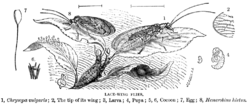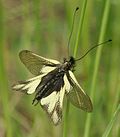| (5 intermediate revisions by the same user not shown) | |||
| Line 14: | Line 14: | ||
| subdivision = | | subdivision = | ||
see text | see text | ||
| − | }} | + | }}I am doing this topic |
| + | |||
The [[insect]] [[order (biology)|order]] '''Neuroptera''', or net-winged insects, includes the [[lacewing]]s, [[Mantidfly|mantidflies]], [[antlion]]s, and their relatives (the group that was once known as the '''Planipennia'''). The order contains some 4000 species. Traditionally, the order also included [[alderfly|alderflies]], [[fishfly|fishflies]], [[dobsonfly|dobsonflies]], and [[snakefly|snakeflies]], but these are now generally considered to be separate orders (the [[Megaloptera]] and [[Raphidioptera]]). Sometimes the name '''Neuropteroidea''' (syn. Neuropterida)<ref>http://mail.bio.pu.ru/win/entomol/KLUGE/nom/Neuropteroidea.htm</ref> is used to refer to these three orders as a group. | The [[insect]] [[order (biology)|order]] '''Neuroptera''', or net-winged insects, includes the [[lacewing]]s, [[Mantidfly|mantidflies]], [[antlion]]s, and their relatives (the group that was once known as the '''Planipennia'''). The order contains some 4000 species. Traditionally, the order also included [[alderfly|alderflies]], [[fishfly|fishflies]], [[dobsonfly|dobsonflies]], and [[snakefly|snakeflies]], but these are now generally considered to be separate orders (the [[Megaloptera]] and [[Raphidioptera]]). Sometimes the name '''Neuropteroidea''' (syn. Neuropterida)<ref>http://mail.bio.pu.ru/win/entomol/KLUGE/nom/Neuropteroidea.htm</ref> is used to refer to these three orders as a group. | ||
| Line 20: | Line 21: | ||
The adults of this order possess four membranous wings, with the forewings and hindwings about the same size, and with many [[vein]]s. They have chewing mouthparts, and undergo complete [[Metamorphosis (biology)|metamorphosis]]. Most are predatory, but a few exceptions occur. | The adults of this order possess four membranous wings, with the forewings and hindwings about the same size, and with many [[vein]]s. They have chewing mouthparts, and undergo complete [[Metamorphosis (biology)|metamorphosis]]. Most are predatory, but a few exceptions occur. | ||
| − | + | == Taxonomy == | |
| + | {{userboxtop|toptext= }} | ||
| + | {{clade| style=font-size:75%;line-height:75% | ||
| + | |label1= | ||
| + | |1={{clade | ||
| + | |label1=? | ||
| + | |1={{clade | ||
| + | |1=Dilaridae | ||
| + | |2={{clade | ||
| + | |1=Berothidae | ||
| + | |2=[[Mantispidae]] | ||
| + | }} | ||
| + | }} | ||
| + | |2={{clade | ||
| + | |1=[[Psychopsidae]] | ||
| + | |2={{clade | ||
| + | |1=[[Nymphidae]] | ||
| + | |2={{clade | ||
| + | |1=[[Nemopteridae]] | ||
| + | |2={{clade | ||
| + | |1=[[Myrmeleontidae]] | ||
| + | |2=[[Ascalaphidae]] | ||
| + | }} | ||
| + | }} | ||
| + | }} | ||
| + | }} | ||
| + | |label3=? | ||
| + | |3=[[Coniopterygidae]] | ||
| + | |label4=? | ||
| + | |4=[[Ithonidae]] | ||
| + | |label5=? | ||
| + | |5=[[Osmylidae]] | ||
| + | |label6=? | ||
| + | |6=[[Neurorthidae]] | ||
| + | |label7=? | ||
| + | |7=[[Sisyridae]] | ||
| + | |label8=? | ||
| + | |8=[[Hemerobiidae]] | ||
| + | |label9=? | ||
| + | |9=[[Chrysopidae]] | ||
| + | |label10=? | ||
| + | |10=[[Polystoechotidae]]<!-- JSystPal4:119; 4:307 --> | ||
| + | |label11=? | ||
| + | |11=[[Rapismatidae]] | ||
| + | |label12=? | ||
| + | |12=[[Rafaelidae]]<!-- CretaceousRes26:845 --> | ||
| + | }} | ||
| + | }} | ||
| + | <center><small>Partial phylogeny of the order.<ref>Oswald, John D. 1995. Neuroptera. Lacewings, antlions, owlflies, etc. [http://tolweb.org/Neuroptera/8220/1995.01.01]</ref></small></center> | ||
| + | {{userboxbottom}} | ||
| + | [[Image:LacewingsLyd.png |250px|thumb|Life cycle of lacewings]] | ||
| + | *Superfamily [[Coniopterygoidea]] | ||
| + | **Family [[Coniopterygidae]]: dustywings | ||
| + | *Superfamily [[Ithonioidea]] | ||
| + | **Family [[Ithonidae]]: moth lacewings | ||
| + | *Superfamily [[Hemerobioidea]] | ||
| + | **Family [[Chrysopidae]]: green lacewings, stinkflies | ||
| + | **Family [[Dilaridae]]: pleasing lacewings | ||
| + | **Family [[Hemerobiidae]]: brown lacewings | ||
| + | **Family [[Polystoechotidae]]: giant Lacewings | ||
| + | **Family [[Psychopsidae]] | ||
| + | *Superfamily [[Osmyloidea]] | ||
| + | **Family [[Osmylidae]] | ||
| + | **Family [[Neurorthidae]] | ||
| + | **Family [[Sisyridae]]: spongillaflies | ||
| + | *Superfamily [[Mantispoidea]] | ||
| + | **Family [[Berothidae]]: beaded lacewings | ||
| + | **Family [[Mantispidae]]: mantidflies | ||
| + | *Superfamily [[Myrmeleontoidea]] | ||
| + | **Family [[Palaeoleontidae]]<!-- Palaeontology48:1409 --> | ||
| + | **Family [[Ascalaphidae]]: ascalaphids, [[Owl fly|owlflies]] | ||
| + | **Family [[Myrmeleontidae]]: ant-lions | ||
| + | **Family [[Nemopteridae]]: spoonwings | ||
| + | **Family [[Nymphidae]] | ||
== References == | == References == | ||
| Line 26: | Line 100: | ||
*{{cite book|author=[[David Grimaldi|Grimaldi, D.]] and [[Michael S. Engel|Engel, M.S.]] |title=Evolution of the Insects|year=[[2005]]|publisher=[[Cambridge University Press]]|id=ISBN 0-521-82149-5}} | *{{cite book|author=[[David Grimaldi|Grimaldi, D.]] and [[Michael S. Engel|Engel, M.S.]] |title=Evolution of the Insects|year=[[2005]]|publisher=[[Cambridge University Press]]|id=ISBN 0-521-82149-5}} | ||
| + | ==External Links== | ||
| + | [http://www.metafro.be/neuroptera/collection Illustrated database of Neuroptera (insects)] | ||
<gallery> | <gallery> | ||
| − | Image:Libelloides coccajus 210505.jpg|'' | + | Image:Libelloides coccajus 210505.jpg|''Ascalaphus libelluloides'', an owlfly |
Image:Ameisenjungfer.jpg|''Euroleon nostras'', an ant-lion | Image:Ameisenjungfer.jpg|''Euroleon nostras'', an ant-lion | ||
Image:Ameisenloewe.jpg|Antlion larva | Image:Ameisenloewe.jpg|Antlion larva | ||
| Line 56: | Line 132: | ||
[[pl:Sieciarki]] | [[pl:Sieciarki]] | ||
[[pt:Neuroptera]] | [[pt:Neuroptera]] | ||
| + | [[sl:Pravi mrežekrilci]] | ||
[[sv:Nätvingar]] | [[sv:Nätvingar]] | ||
[[zh:脈翅目]] | [[zh:脈翅目]] | ||
Revision as of 06:24, 11 September 2007
Template:TaxoboxI am doing this topic
The insect order Neuroptera, or net-winged insects, includes the lacewings, mantidflies, antlions, and their relatives (the group that was once known as the Planipennia). The order contains some 4000 species. Traditionally, the order also included alderflies, fishflies, dobsonflies, and snakeflies, but these are now generally considered to be separate orders (the Megaloptera and Raphidioptera). Sometimes the name Neuropteroidea (syn. Neuropterida)& is used to refer to these three orders as a group.
The adults of this order possess four membranous wings, with the forewings and hindwings about the same size, and with many veins. They have chewing mouthparts, and undergo complete metamorphosis. Most are predatory, but a few exceptions occur.
Taxonomy
Template:Userboxtop Template:Clade
- Superfamily Coniopterygoidea
- Family Coniopterygidae: dustywings
- Superfamily Ithonioidea
- Family Ithonidae: moth lacewings
- Superfamily Hemerobioidea
- Family Chrysopidae: green lacewings, stinkflies
- Family Dilaridae: pleasing lacewings
- Family Hemerobiidae: brown lacewings
- Family Polystoechotidae: giant Lacewings
- Family Psychopsidae
- Superfamily Osmyloidea
- Family Osmylidae
- Family Neurorthidae
- Family Sisyridae: spongillaflies
- Superfamily Mantispoidea
- Family Berothidae: beaded lacewings
- Family Mantispidae: mantidflies
- Superfamily Myrmeleontoidea
- Family Palaeoleontidae
- Family Ascalaphidae: ascalaphids, owlflies
- Family Myrmeleontidae: ant-lions
- Family Nemopteridae: spoonwings
- Family Nymphidae
References
- ↑ http://mail.bio.pu.ru/win/entomol/KLUGE/nom/Neuropteroidea.htm
- ↑ Oswald, John D. 1995. Neuroptera. Lacewings, antlions, owlflies, etc. [1]
- Grimaldi, D. and Engel, M.S. (2005). Evolution of the Insects. Cambridge University Press. ISBN 0-521-82149-5.
External Links
Illustrated database of Neuroptera (insects)
- Ameisenjungfer.jpg
Euroleon nostras, an ant-lion
Template:Wikispecies Template:Wikibookspar
de:Netzflügler es:Neuroptera fa:بالتوریها fr:Neuroptera ko:풀잠자리목 hsb:Sytkokřidłač it:Neuroptera he:מרושתי כנף ka:ბადეფრთიანები lt:Tinklasparniai nl:Netvleugeligen ja:アミメカゲロウ目 no:Nettvinger pl:Sieciarki pt:Neuroptera sl:Pravi mrežekrilci sv:Nätvingar zh:脈翅目



